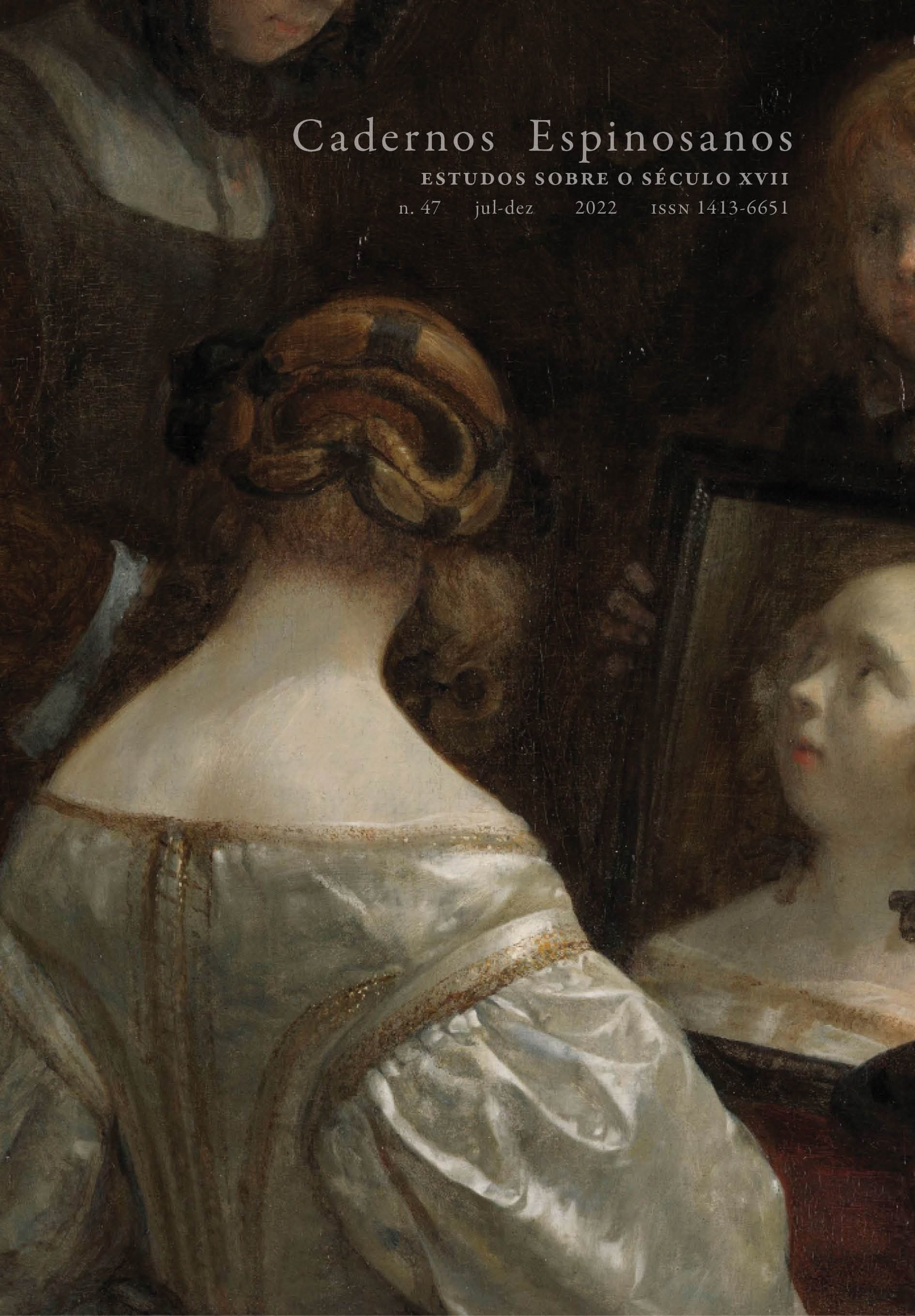Can real existence be proved only by real existence? Locke’s criticism of the cartesian a priori proof
DOI:
https://doi.org/10.11606/issn.2447-9012.espinosa.2022.206390Keywords:
Locke, Descartes, A priori Proof, Innatism, EmpiricismAbstract
In An Essay Concerning Human Understanding (iv.x.7), John Locke registered a brief appreciation of the Cartesian a priori proof, stating that it would be, taken separately, an imperfect way of approaching the question of the existence of God. However, in a two-page manuscript dated 1696, he considered this proof inconclusive, since it could be used by both theists and atheists, leaving the question unfinished. Considering the scarcity of Lockean studies dealing with this manuscript, this paper proposes an interpretation of Lockean criticism of the Cartesian a priori proof, in order to verify if the English philosopher changed his opinion. The analysis of the text in question shows that Locke has not changed his mind significantly, because his conclusions registered in the manuscript are based on the rejection of innate ideas and immutable essences, in accordance with book I of the Essay. Additionally, his criticisms have a probable Thomistic background in the objections of Johannes Caterus.
Downloads
References
AARON, R. I. (1965). John Locke. Oxford: Claredon Press.
ANSELMO, S. (2016). Proslógio. Porto Alegre: Concreta.
COTTINGHAM, J. (1995). Dicionário Descartes. Rio de Janeiro: Jorge Zahar.
DESCARTES, R. (2009). Discurso do método. São Paulo: Martins Fontes.
DESCARTES, R. (1983). Discurso do método; Meditações; Objeções e respostas; As paixões da alma; Cartas. São Paulo: Abril Cultural.
DESCARTES, R. (1977). Meditaciones metafísicas con objeciones y respuestas. Madrid: Ediciones Alfaguara.
DESCARTES, R. (2004). Meditações sobre filosofia primeira. Campinas: Editora da Unicamp.
DESCARTES, R. (1997). Princípios da filosofia. Lisboa: Edições 70.
DESCARTES, R. (1991). The philosophical writings of Descartes. Cambridge: Cambridge University Press.
FABRO, C. (2014). L’uomo e il rischio di Dio. Roma: EDIVI.
HARRELSON, K. J. (2009). The Ontological Argument from Descartes to Hegel. Amherst: Humanity Books.
HATFIELD, G. (2003). Routledge Philosophy Guidebook to Descartes and the Meditations. London: Routledge.
KANT, I. (2001). Crítica da Razão Pura. Lisboa: Fundação Calouste Gulbenkian.
KING, P. (1829). The life of John Locke: with extracts from his correspondence, journals and common-place books. London: H. Colburn.
LASCANO, M. P. (2017). Arguments for the existence of God. In: KAUFMAN, D. (Ed.). The Routledge companion to seventeenth century philosophy. New York: Routledge, pp. 505-535.
LOCKE, J. (2014). Ensaio sobre o entendimento humano. Lisboa: Fundação Calouste Gulbenkian.
LOCKE, J. (1824). The Works of John Locke in Nine Volumes, v. 3. London: Rivington.
LOWE, E. J. (2013). The ontological argument. In: COPAN, P.; MEISTER, C. (Ed.). The Routledge Companion to Philosophy of Religion. Abingdon: Routledge, pp. 391-400.
MALCOLM, N. (1960). Anselm’s ontological arguments. The Philosophical Review, New York, v. 69, n. 1, pp. 41-62.
MEYERS, R. G. (2017). Empirismo. Petrópolis: Vozes.
MILTON, J. R. (2011). A vida e a época de Locke. In: CHAPPELL, V. (Org.). Locke. Aparecida: Ideias & Letras, pp. 17-40.
MILTON, J. R. (1994). Locke at Oxford. In: ROGERS, G. A. J. (Ed.). Locke's Philosophy: content and context. New York: Oxford University Press, pp. 17-40.
ROGERS, G. A. J. (2014). God. In: SAVONIUS-WROTH, S.-J.; SCHUURMAN, P.; WALMSLEY, J. (Ed.). The Bloomsbury Companion to Locke. London & New York: Bloomsbury Publishing.
ROGERS, G. A. (2007). The intellectual setting and aims of the Essay. In: NEWMAN, L. (Ed.). The Cambridge companion to Locke’s Essay Concerning Human Understand. New York: Cambridge University Press, pp. 07-32.
SANTOS, M. F. (1960). O homem perante o infinito. São Paulo: Logos.
SCHUURMAN, P. (2014). DESCARTES, René. In: SAVONIUS-WROTH, S.-J.; SCHUURMAN, P.; WALMSLEY, J. (Ed.). The Bloomsbury Companion to Locke. London & New York: Bloomsbury Publishing.
SCRIBANO, E. (2007). Guia para leitura das Meditações Metafísicas de Descartes. São Paulo: Loyola.
SHERIDAN, P. (2013). Compreender Locke. Petrópolis: Vozes.
SILVA, L. A. 2020. John Locke e a prova a priori da existência de Deus. Curitiba. 94 pp. Dissertação (Mestrado). Universidade Federal do Paraná - UFPR.
SILVA, S. H. S. (2008). Locke e a crítica à prova cartesiana da existência necessária de Deus: um problema moral. Polymatheia, Fortaleza, vol. 4, n. 5, pp. 145-159.
TOMATIS, F. (2003). O argumento ontológico: a existência de Deus de Anselmo a Shelling. São Paulo: Paulus.
TULLY, J. (2006). A discourse on property: John Locke and his adversaries. Cambridge: Cambridge University Press.
VON LEYDEN, W. (2002). Introduction. In: LOCKE, J. Essays on the law of nature. Oxford: Clarendon Press.
WOOLHOUSE, R. (2011). A teoria do conhecimento. In: CHAPPELL, V. (Org.). Locke. Aparecida: Ideias & Letras, pp. 183-211.
XAVIER, M. L. L. O. (2011). A Questão do Argumento Anselmiano. Philosophica, Lisboa, v. 37, pp. 241-270.
Downloads
Published
Issue
Section
License
Copyright (c) 2022 Leandro Alves da Silva

This work is licensed under a Creative Commons Attribution-NonCommercial-ShareAlike 4.0 International License.
Autores que publicam nesta revista concordam com os seguintes termos:
- Autores mantém os direitos autorais e concedem à revista o direito de primeira publicação, com o trabalho simultaneamente licenciado sob a Licença Creative Commons Attribution que permite o compartilhamento do trabalho com reconhecimento da autoria e publicação inicial nesta revista.
- Autores têm autorização para assumir contratos adicionais separadamente, para distribuição não-exclusiva da versão do trabalho publicada nesta revista (ex.: publicar em repositório institucional ou como capítulo de livro), com reconhecimento de autoria e publicação inicial nesta revista.
Authors who publish in this journal agree to the following terms:
b. Authors are authorized to take on additional contracts separately, to non-exclusive distribution of the article published in this journal (ex.: to publish in institutional repository or as part of a book), with an acknowledgment of its initial publication in this journal.


